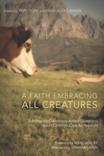A Faith Embracing All Creatures, reviewed by Stephen Vantassel
From Pneuma Review Fall 2013.
 Tripp York and Andy Alexis-Baker, eds., A Faith Embracing All Creatures: Addressing Commonly Asked Questions about Christian Care for Animals (Eugene, OR: Cascade Books, 2012), 212 pages, ISBN 9781610977012.
Tripp York and Andy Alexis-Baker, eds., A Faith Embracing All Creatures: Addressing Commonly Asked Questions about Christian Care for Animals (Eugene, OR: Cascade Books, 2012), 212 pages, ISBN 9781610977012.
This book is another in an ever growing line of texts attempting to convince Christians that the Church’s traditional understanding of human-animal relations is wrong. Put another way, the authors contend that Christianity’s long-standing belief that animals were created for human use and food is fundamentally misguided. These authors argue a different reading of scripture reveals that:
- God’s ideal and original plan was for humans and animals to co-exist in non-violent (i.e. vegetarian) relationship.
- God only allowed humans to eat of meat because of the conditions following the Noahic flood.
- Adoption of a vegetarian lifestyle is part of our call as Christians to extend Christ’s compassion toward all of creation and his work to redeem and restore harmony in the broader creation.
At first glance, these points appear Christian. What Christian doesn’t support the notion of compassion and redemption? However, a closer look at these points reveals that adopting them requires believers to undergo a dramatic paradigm shift in the interpretation of large sections of scripture. Since paradigm shifts are intellectually and emotional difficult for people to make, each of the 15 authors take up a particular concept in scripture or theology to show how it can be harmonized to support a vegetarian or vegan perspective.
As expected, the book focusses on specific scriptural and theological issues that would be troublesome for a vegetarian mandate, such as the dominion mandate, the Noahic Covenant, animal sacrifices, the value of humans in relationship to animals, and Jesus’ diet and treatment of animals. The authors repeatedly suggest that Christians should read scripture differently and through the prism of peace, harmony (i.e. shalom), Christ’s compassion and reconciliation, and the eschatology of Isaiah’s prophecy concerning the wolf and the lamb (Isa 11:6; 65:25).
Christians should pause whenever an individual or group claims to correct the church’s historic understanding of Scriptural teaching and like the Berean’s (Acts 17:10-11), investigate the claims carefully against the testimony of scripture fairly interpreted. Additionally, Christians should inquire whether the new interpreters have engaged proponents of the traditional view in any substantive way as the Reformers did when debating with Catholic teaching and practice.
Regrettably, the authors of this text fail on both points. Though ostensibly offering a new interpretation of scripture, a closer look reveals that their argument requires an arbitrary neglect of vast sections of problematic scriptures. Even the passages selected for discussion are handled in such a cursory and fanciful manner that readers should question the strength of their claims.
Category: Fall 2013, Living the Faith


